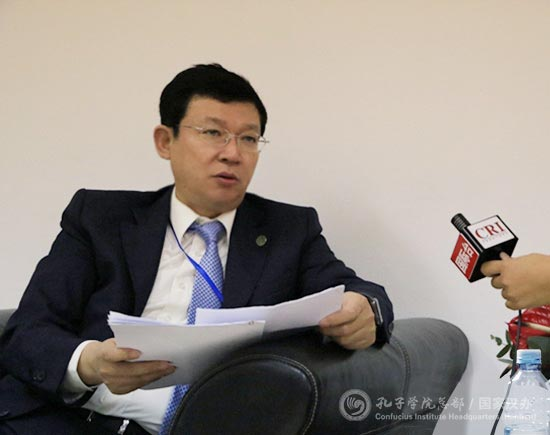High Degree of Localization Drives Rapid Development of Confucius Institutes in Africa

Ma Jianfei in the interview
In the end of 2005, the first Confucius Institute was set up at the University of Nairobi, Kenya in Africa. Since then, Confucius Institutes have flourished in this region. The 2018 Joint Conference of Confucius Institutes in Africa was held in Maputo, the capital of Mozambique, from May 14th to 15th. Ma Jianfei, Deputy Chief Executive of the Confucius Institute Headquarters accepted an interview from the journalist.
As of now, 41 African countries have established 54 Confucius Institutes and 30 Confucius Classrooms with more than 1.4 million various types of students. Although Africa does not hold the largest number of Confucius Institutes, it is regarded as the region with the highest teaching efficiency among the Confucius Institutes across the world. Ma Jianfei expressed that there are three distinctive features of running Confucius Institutes in Africa. The first is the large scale and remarkable influence. ¡°In 2017, registered students in Africa stand at 150,000. Approximately 2500 cultural and academic activities of various types were held, attracting more than 840,000 participants. This means that more than 800,000 people jointly took part in various activities hosted by the Confucius Institutes. It exerts tremendous influence on local areas. The average number of registered students in the 54 Confucius Institutes exceeds 3000, among which 3 Confucius Institutes have more than 10,000 registered students.¡± Ma Jianfei said.
The second is high-level integration. Thanks to the vigorous support of the Confucius Institutes in Africa, 14 African countries have put the Chinese language on the list of language courses in their national education system. 36 out of 54 Confucius Institutes have offered Chinese language credit courses, and 21 universities and colleges where the Confucius Institutes are located have set up Chinese major. All these measures show that Chinese language education is integrated into the local higher education system. In addition, the Confucius Institutes in Africa interact profoundly with the government and all sectors of social services, and provide Chinese language courses to local governments.
The third and the most prominent feature is the combination of language and culture with vocational skills training. The Confucius Institutes in Africa offer the courses that accommodate to the needs of local social development. Ma Jianfei said that these trainings cover various fields such as finance, accounting, computer, agriculture, and electro-mechanics. For example, the Confucius Institute at Technical Vocational Education and Training Institute in Ethiopia has provided training in mechatronics, body materials and technology, and heavy-duty automotive technology. The University of Libya offers skills training for bamboo and rattan weaving.
Statistics indicated that since 2012, the number of students in African Confucius Institutes has grown by nearly 36% every year, with registered students reaching 150,000 in 2017; Chinese language course has expanded at an average annual rate of 40.3%, and specified school space has increased by 34% annually.
Responding to the question concerning the reason for the rapid development of the Confucius Institutes in Africa, Ma Jianfei said, ¡°Localization has been a focus for African Confucius Institutes since their inception, which can be reflected in two major aspects. First is the localization of teachers. We proactively support all Confucius Institutes in Africa to cultivate local talents. For example, in 2017, African Confucius Institutes trained more than 1500 and recruited nearly 100 local teachers, laying a sound foundation for localization and sustainable development of the Confucius Institutes. Second, close integration with the actual local needs. To meet the increasing demand of China-invested enterprises for local talents, African Confucius Institutes provide point-to-point services so as to ensure the cultivation of local talented employee can accommodate the immediate needs of enterprises.¡±
Ma Jianfei expressed that as Chinese language teaching integrates more deeply into the national educational system in African countries, the age of people who study Chinese tends to be lower. The Confucius Institutes in Africa will pay more attention to combining realities of educational systems in African countries so as to put forward more targeted solutions. Meanwhile, the Confucius Institutes will further promote the localization of teachers by training to ensure the sustainable development of Chinese language education. The Confucius Institutes will also endeavor to achieve specification of Chinese backbone talents. In addition, the construction of digitized Confucius Institutes will also be one of the priorities of Confucius Institutes.
(Story by Zhu Wanling, CRI Online, China Radio International)
Related News

